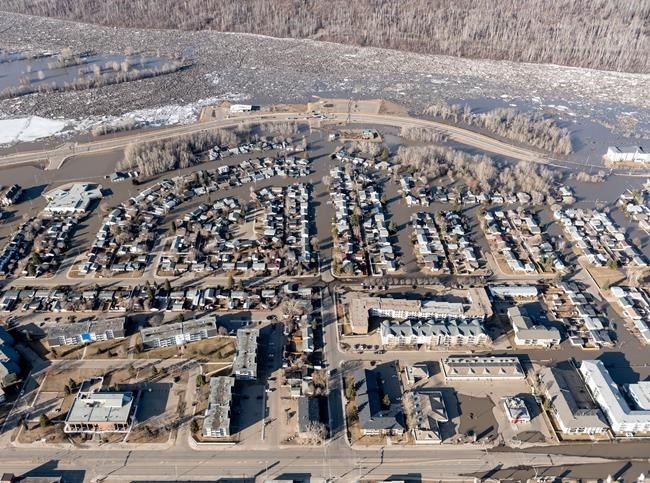FORT MCMURRAY, Alta. — Fort McMurray resident Michelle Toner says it's been a hectic, sad week in the northern Alberta city.
"Dealing with low oil prices, COVID-19 and now this massive flood that hasn't happened in 100 years — it's a lot, it's a lot for people to take," she said Wednesday.
Toner, 41, volunteered at one registration centre Monday, when officials evacuated much of the city's downtown.
"I felt like I couldn't sit at home and scroll Facebook all day and look at everything in town that was flooded," she said. "Even though I have two small kids myself and there is a risk of COVID, I said to my husband, 'If I don't help and everybody doesn't go, then who are the helpers?'
"Who was going to help all of these people?"
Nearly 13,000 were forced from their homes in Fort McMurray's downtown this week after a 25-kilometre ice jam on the Athabasca River caused major flooding.
The flooding has led to a second state of local emergency on top of one declared last month because of the pandemic.
Fort McKay First Nation, which is about 60 kilometres north of Fort McMurray, reported a death related to the flooding.
Officials said in a news release that two community members were found in distress in the Athabasca River near their family trapping grounds north of Fort McKay on Tuesday. They were airlifted to the hospital, where an older man died.
Another 450 residents from Fort Vermilion were also evacuated from that area due to another ice jam on the Peace River.
Premier Jason Kenney said residents of northern Alberta forced from their homes due to flooding will receive emergency payments. Evacuees can apply for $1,250 for each adult and $500 for each child starting Monday.
Kenney said those who are being sheltered in hotels and other accommodations will also have their costs covered by the province and local municipalities.
"It is just too much for some people to bear," he said. "But we want them to know that the government and the people of Alberta stand with them and we are providing every possible support to them."
Prime Minister Justin Trudeau's office said he spoke with Kenney about the spring flooding and indicated the federal government is ready to provide any assistance that is requested, including helping Alberta with recovery and clean-up efforts.
On top of dealing with COVID-19 and an economic downturn, a raging wildfire in May 2016 forced the evacuation of the entire city and destroyed 2,400 homes and buildings.
Toner, who was evacuated four years ago, said the latest natural disaster has taken a toll.
"To start seeing those lineups again and then hearing helicopters overhead — it was a little all too familiar," she said.
"This time of year is really emotional for people in Fort McMurray."
Toner said she knew when she decided to volunteer that she would have access to protective equipment, because Fort McMurray is a "safety-conscious community."
As she was volunteering, she saw a mother washing her baby with a bottle of water in the parking lot. Another family had a child on a feeding tube and wasn't sure where they were going to stay that night.
"They're heavy things," she said.
Toner, who spent 14 hours volunteering, said she mostly helped register people at their car windows or direct traffic outside.
She said she was one of about 30 volunteers who helped evacuees get registered. Hundreds of others put down sandbags around the hospital or installed dams.
Kenney said some in Fort McMurray have expressed concerns about COVID-19 restrictions, such as physical distancing and gathering limits of 15 people while volunteering.
The province's chief medical officer of health has exempted municipality residents from those restrictions, he said.
He added the province has also shipped masks to Fort McMurray to help reduce the spread of the virus.
Scott Davis, director of emergency management with the Regional Municipality of Wood Buffalo, said the exemption only applies to those who are helping with the flood.
"We are still trying to do physical distancing," he said. "We also want to be sure that we follow wearing personal protective equipment as it's available."
Davis said staff will still do everything they can to protect people from the spread of the virus.
There are currently 16 active cases of COVID-19 in Fort McMurray, Alberta Health says. There is one outbreak in the area at the Kearl oilsands work camp, but it has not been evacuated.
From her time volunteering on the front line of the flood, Toner said COVID-19 doesn't seem to be stopping people from helping.
"They were all wearing masks and gloves," she said. "But they were really more concerned about the people and the community than they were about the virus."
This report by The Canadian Press was first published April 29, 2020
— By Colette Derworiz in Edmonton, with files from Bob Weber.
The Canadian Press


